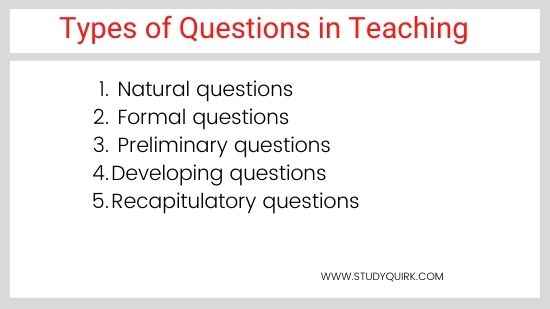In Teaching Learning Process, Questioning has a significant role for an effective teaching. A teacher asks different types of questions for different purposes i.e. to maintain discipline, to test the previous knowledge, and to motivate the learners. So there are different types of questions which will be discuss d on this page see >> Questioning in Teaching.
Types of questions in teaching
Questioning is an important device of teaching. Asking the right questions at the right purpose is a core qualification of a teacher. A teacher asks various types of questions for different need of the classroom situation. So questions can be of different types according to their use and purpose of using.
The types of questioning in the classroom are

1. Natural question: The questions which are asked spontaneously or naturally by a person are known as natural questions. These types of questions are asked by students in the classroom. Here the questioner (students) wants to know the information on the topic on which they do not have knowledge. So questions which are aske d by students are generally fall into this category of natural questions.
2. Formal questions: The questions in which the questioner knows the answer are known as formal questions. Questions asked by teacher are generally belonging to formal type of questions. Because the teacher knows the answer on which he asks the question. Here the teacher’s purpose of questioning is to stimulate some type of responses on the side of students. Formal types of questions are further subdivide into three categories.
Three types of formal questioning
- Preliminary questions: Preliminary questions are also known introductory questions. As the name suggest this types of questions are asked in the beginning of a lesson it is asked to test the previous knowledge of the students. And to connect the new knowledge to the known knowledge. Here the teacher follows the maxims known to unknown. See>>> Maxims of Teaching.
While asking introductory questions the teacher must keep in mind the following few points to make effective teaching.
- Teachers must ask three to five questions at the beginning of a lesson.
- Questions should be relevant to the lesson or subject matter.
- The teacher should ask the questions that help in revision the previous lesson taught.
2. Developing questions: Teaching is a complex activity. It has been done in different phases of teaching. Developing questions are asked in the interactive phase.. All questions asked by a teacher during his/her teaching are developing questions.
The main purpose of developing questions is to develop a lesson, stimulate the mental activity of the students, to develop new facts and to grasp the attention of the students in teaching.
Important link>>> Suggestions for good questioning in teaching.
3. Recapitulatory Questions: At the end of a lesson a teacher summarise and highlights the main point and ask questions which are call as a recapitualtory questions.
The main objectives of these types of questions are
- To highlight the main point of the lesson.
- And to test the acquired knowledge of the students.
- To make the leaned knowledge permanent of the students.
Suggestions for good recapitualtory questions
- The questions asked by the teacher should be relevant to the subject matter.
- A teacher must give 10 to 12 seconds to think and responds the questions.
- The questions may be long or short type of questions.
- The blackboard must rubbed off at the end of the lesion.
Conclusion
Questioning in teaching is an important teaching device. A teacher can use for a successful teaching. The two types of questions are natural questions and formal questions. Formal questions are three categories. These are introductory questions, developing questions and recapitualatory questions that have discussed above. See>>> Explanation as a teaching tool.
| Teaching as a profession | Click here |
| Studyquirk home | Click here |